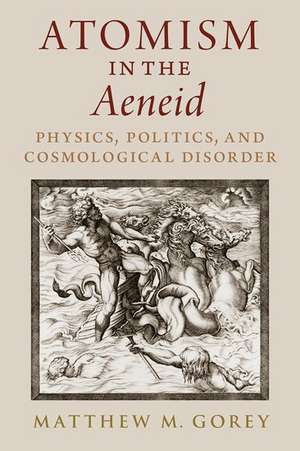Atomism in the Aeneid: Physics, Politics, and Cosmological Disorder
Autor Matthew M. Goreyen Limba Engleză Hardback – 4 aug 2021
Preț: 478.07 lei
Preț vechi: 526.73 lei
-9% Nou
Puncte Express: 717
Preț estimativ în valută:
91.48€ • 99.77$ • 77.14£
91.48€ • 99.77$ • 77.14£
Carte disponibilă
Livrare economică 24-29 martie
Preluare comenzi: 021 569.72.76
Specificații
ISBN-13: 9780197518748
ISBN-10: 0197518745
Pagini: 184
Dimensiuni: 236 x 160 x 23 mm
Greutate: 0.41 kg
Editura: Oxford University Press
Colecția OUP USA
Locul publicării:New York, United States
ISBN-10: 0197518745
Pagini: 184
Dimensiuni: 236 x 160 x 23 mm
Greutate: 0.41 kg
Editura: Oxford University Press
Colecția OUP USA
Locul publicării:New York, United States
Recenzii
Gorey's book is a very valuable addition to the scholarship on the Aeneid, and, in more general terms, the interplay of philosophy and literature, as this study makes it very clear that Vergil read the de rerum natura as both a literary text and firm part of the epic tradition, but also as a philosophical work.
This is a book that opens many doors in an intertextual edifice, as it offers tantalising, succinct, occasionally enigmatic insights into the Augustan poet's engagement with his Republican predecessor Lucretius. Its reading is swiftly over; the implications of its rich tapestry of ideas linger long in the mind.
Gorey has written an important book that should be useful for anyone working on Vergil, the reception of Lucretius or Epicureanism during the Roman period.
A welcome contribution to a very important topic. As it develops a robust and challenging thesis, it offers readers a wealth of insightful observations which add perceptibly to our understanding of some crucial aspects of the Aeneid.
Even though the Aeneid is one of the most-studied texts from Republican Rome, Gorey gives us an important insight ... a fresh perspective, persuasively argued, for those studying the bedrock texts upon which the conception of the universe in the Western world arose.
This important and original contribution to the understanding of allusion to Lucretius in the Aeneid has a clearly stated and clearly articulated thesis.
The book is well laid out and easy to read.
This is a book that opens many doors in an intertextual edifice, as it offers tantalising, succinct, occasionally enigmatic insights into the Augustan poet's engagement with his Republican predecessor Lucretius. Its reading is swiftly over; the implications of its rich tapestry of ideas linger long in the mind.
Gorey has written an important book that should be useful for anyone working on Vergil, the reception of Lucretius or Epicureanism during the Roman period.
A welcome contribution to a very important topic. As it develops a robust and challenging thesis, it offers readers a wealth of insightful observations which add perceptibly to our understanding of some crucial aspects of the Aeneid.
Even though the Aeneid is one of the most-studied texts from Republican Rome, Gorey gives us an important insight ... a fresh perspective, persuasively argued, for those studying the bedrock texts upon which the conception of the universe in the Western world arose.
This important and original contribution to the understanding of allusion to Lucretius in the Aeneid has a clearly stated and clearly articulated thesis.
The book is well laid out and easy to read.
Notă biografică
Matthew M. Gorey is a Visiting Assistant Professor at Wabash College.
